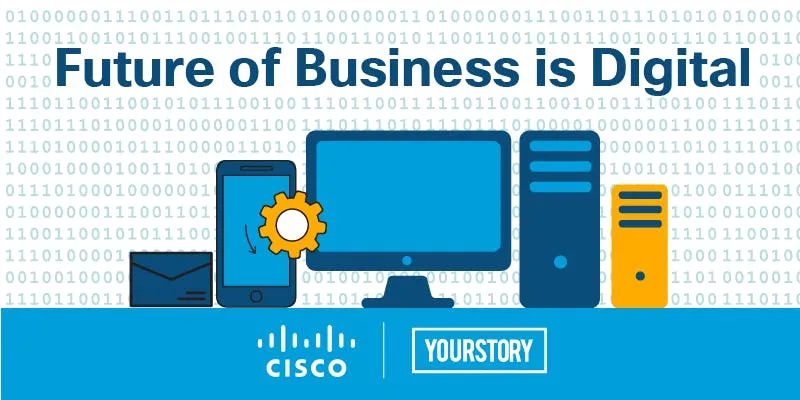Cybersecurity, chatbots, digital for SMEs and more at the YourStory-Cisco ‘Future of Business’ event
The future of business is digital. In fact, it is the present.
There was a time when ‘going digital’ was a buzzword, and it meant setting up a website or starting a Facebook page.
Now, there is a new catchphrase: digital transformation. According to IT industry estimates, it is a $19 trillion global opportunity. It encompasses everything from cloud and end-to-end network solutions to cybersecurity, artificial intelligence and IoT.
Digital has ceased to be an afterthought. Today, businesses are born on digital. Or so believed the gathering of entrepreneurs, innovators, SME owners, security and IT professionals, and digital marketers at the YourStory-Cisco Future of Business event in Mumbai.

The conversations centred on a few areas.
Cybersecurity is critical
There is an imperative need for organisations to secure their systems in an increasingly “vulnerable” world, where hack codes are being used, reused and injected into the “supply chain” in no time. Even small and medium enterprises aren’t spared from malware attacks, data theft, privacy invasion, etc.
But, cybersecurity as a concept continues to be alien to most organisations. According to a study conducted by Cisco, as many as 71 percent of executives believe that cybersecurity hinders innovation.
Jayachandran Vishak Raman, Director Security Business, Cisco India & SAARC, said, “There's a lack of cybersecurity in the digital era. The security solutions that exist today aren't interoperable. They are expensive and there's a serious talent crunch in the cybersecurity industry.”
The dearth of talent naturally stems from the fact that organisations do not attach enough importance to cybersecurity as a goal. The non-availability of a “pervasive” security solution adds to the organisational apathy, according to Cisco.
Jayachandran said,
“It is a fragmented market with over 1,500 vendors trying to offer solutions. Security providers in future would be measured on the time they take between an attack detection and its remediation.”
Chatbots are a fad
Does every business need an artificially intelligent chatbot? Perhaps not, especially if it is a consumer-facing business. But chatbots are in vogue because it makes businesses look ‘cool’ and trendy.
Arpit Ratan, co-founder of Signzy (a regulatory fintech startup) said,
“Artificial intelligence is not at the core of company strategy still. It is being used as a PR tool. Businesses have to ask: do we even require a chatbot?”
Take Amazon, for instance. It has automated possibly all aspects of its operations, including deliveries which will soon be accomplished by drones. But, Amazon customer support continues to be humanised.
Arpit explained why that is significant and well thought of. He said,
“Once you start using AI and machine learning, it helps you achieve several times the efficiency. Productivity in each department is enhanced, sure. But, front ends don't need to be automated. It should be completely humanised. Chatbots interacting with consumers is a negative trend. All functions that require human emotion should remain offline.”
How SMEs become more visible
There is a huge need for digitisation in the SME sector. It helps small businesses expand their reach utilising the limited resources. Observers say that SMEs are finally warming up to the demands of tech and making investments, including hiring talent.
The government too is endeavouring to take SMEs to the market.
Gagandeep Singh, Manager - SME Listing at National Stock Exchange, said:
“There are about 147 SMEs listed on the NSE. It offers them greater visibility and credibility. It also improves their terms with bankers and financiers.”
SMEs that are not tech-enabled and do not match up the speed of scaling that tech-enabled businesses manage, can thrive if they use digital judiciously.
Take Mojo Bars, for instance. This maker of branded snack bars derives 30-40 percent of its revenues through online channels. This has been achieved with minimal marketing, it claimed.
Maulik Mistry, Founder of Mojo Bars, said:
“Digital helps us do targeted advertising and avoid spillover. We use digital to drive sales and not merely create buzz. Posting an ad on Instagram makes more sense for us than advertising on billboards.”
So, small businesses ought to know where their customer is and craft a digital strategy accordingly.







